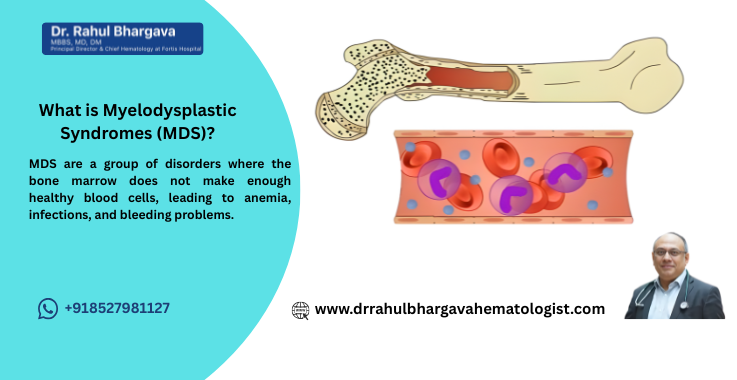Myelodysplastic Syndromes (MDS) Treatment in india

Myelodysplastic Syndromes (MDS) are a group of cancers in which the bone marrow produces poorly formed or dysfunctional blood cells. These syndromes often lead to anemia, infections, and bleeding due to low counts of red cells, white cells, and platelets. MDS primarily affects older adults and, in some cases, may progress to acute myeloid leukemia (AML). Diagnosis typically involves blood tests, bone marrow biopsy, and cytogenetic analysis. Treatment varies depending on the subtype and severity but may include supportive care, medications, chemotherapy, or stem cell transplantation, which is the only potential cure. India has become a preferred destination for MDS treatment due to its advanced medical infrastructure, expert hematologists, and cost-effective care. With significantly lower costs for consultations, medications, and procedures compared to Western nations, patients can access high-quality treatment without financial strain. India offers a balance of affordability and clinical excellence, making it a strong option for international patients.
Understanding Myelodysplastic Syndromes (MDS):
Myelodysplastic Syndromes (MDS) are a group of blood disorders caused by poorly formed or dysfunctional blood cells. MDS is considered a type of cancer, where the bone marrow fails to produce enough healthy blood cells, leading to a variety of health complications. Over time, MDS can worsen, with the potential to develop into acute myeloid leukemia (AML)
Causes of Myelodysplastic Syndromes:
The exact cause of MDS is often unknown. However, several factors may increase the risk, including:
- Age: MDS is more common in individuals over 60.
- Previous Cancer Treatment: Chemotherapy or radiation can damage bone marrow.
- Exposure to Chemicals: Long-term exposure to chemicals like benzene.
- Genetic Factors: Family history or genetic mutations.
- Smoking: Increases the risk of developing MDS.
Types of Myelodysplastic Syndromes:
MDS is classified based on the type of blood cells affected and the severity of the condition. The World Health Organization (WHO) categorizes MDS into several subtypes:
- MDS with Single Lineage Dysplasia (MDS-SLD)
- MDS with Multilineage Dysplasia (MDS-MLD)
- MDS with Ringed Sideroblasts (MDS-RS)
- MDS with Excess Blasts (MDS-EB)
- MDS with Isolated del(5q) Chromosome
- Unclassifiable MDS (MDS-U)
Symptoms of Myelodysplastic Syndromes:
Symptoms of MDS may vary but often include:
- Fatigue or weakness
- Shortness of breath
- Unusual paleness (pallor)
- Frequent infections
- Easy bruising or bleeding
- Petechiae (tiny red spots under the skin)
If you experience any of these symptoms, it’s important to consult with a hematologist.
Diagnosis of Myelodysplastic Syndromes:
Diagnosing MDS involves several tests, including:
- Complete Blood Count (CBC): To check levels of different blood cells.
- Bone Marrow Biopsy: To examine bone marrow cells under a microscope.
- Cytogenetic Analysis: To identify chromosomal abnormalities.
- Flow Cytometry: To study the characteristics of blood cells.
Treatment Options for Myelodysplastic Syndromes:
Treatment for MDS depends on the type and severity of the syndrome, as well as the patient’s overall health. Common treatment options include:
- Supportive Care: Blood transfusions and medications to manage symptoms.
- Medications: Such as growth factors, immunosuppressive drugs, and hypomethylating agents (e.g., azacitidine, decitabine).
- Chemotherapy: For more aggressive cases or when MDS progresses to AML.
- Stem Cell Transplant: The only potential cure for MDS, involving the transplantation of healthy stem cells from a donor.
Cost of Treatment and Stay in India:
The cost of treating Myelodysplastic Syndromes (MDS) in India is significantly lower than in many Western countries, making it an attractive option for medical tourism. The total cost of treatment, including hospital stay, varies depending on the type of MDS, treatment approach, and the duration of care. Here’s an overview of the costs:
Initial Consultation:
- USD: $30 – $100
- INR: ₹2,200 – ₹7,400
Blood Tests (CBC, Bone Marrow Biopsy, Cytogenetic Analysis, etc.):
- USD: $50 – $200
- INR: ₹3,700 – ₹14,800
Medications (per month):
- USD: $200 – $1,500
- INR: ₹15,000 – ₹1,10,000
Chemotherapy (per cycle):
- USD: $400 – $2,500
- INR: ₹30,000 – ₹2,00,000
Stem Cell Transplant (if required):
- USD: $15,000 – $30,000
- INR: ₹12,00,000 – ₹24,00,000
Hospital Stay (per night):
- USD: $25 – $200
- INR: ₹2,000 – ₹15,000
India offers affordable healthcare services with high-quality standards, making it an ideal destination for treating Myelodysplastic Syndromes. The cost is considerably lower compared to countries like the U.S. or the U.K., without compromising on the quality of care.
Frequently Asked Questions
The cost ranges from $200 per month for medications to $30,000 for a stem cell transplant. It depends on the treatment type and duration.
While most forms of MDS are manageable, a stem cell transplant offers the only potential cure, especially for younger and eligible patients.
Treatment duration varies widely. Supportive care may be ongoing, while chemotherapy or transplant timelines depend on the disease stage and patient response.
India offers advanced treatment options, internationally trained doctors, and significantly lower costs compared to Western countries, without compromising care quality.
Yes, many Indian hospitals offer services tailored for international patients, including visa assistance, interpreters, and complete medical support.